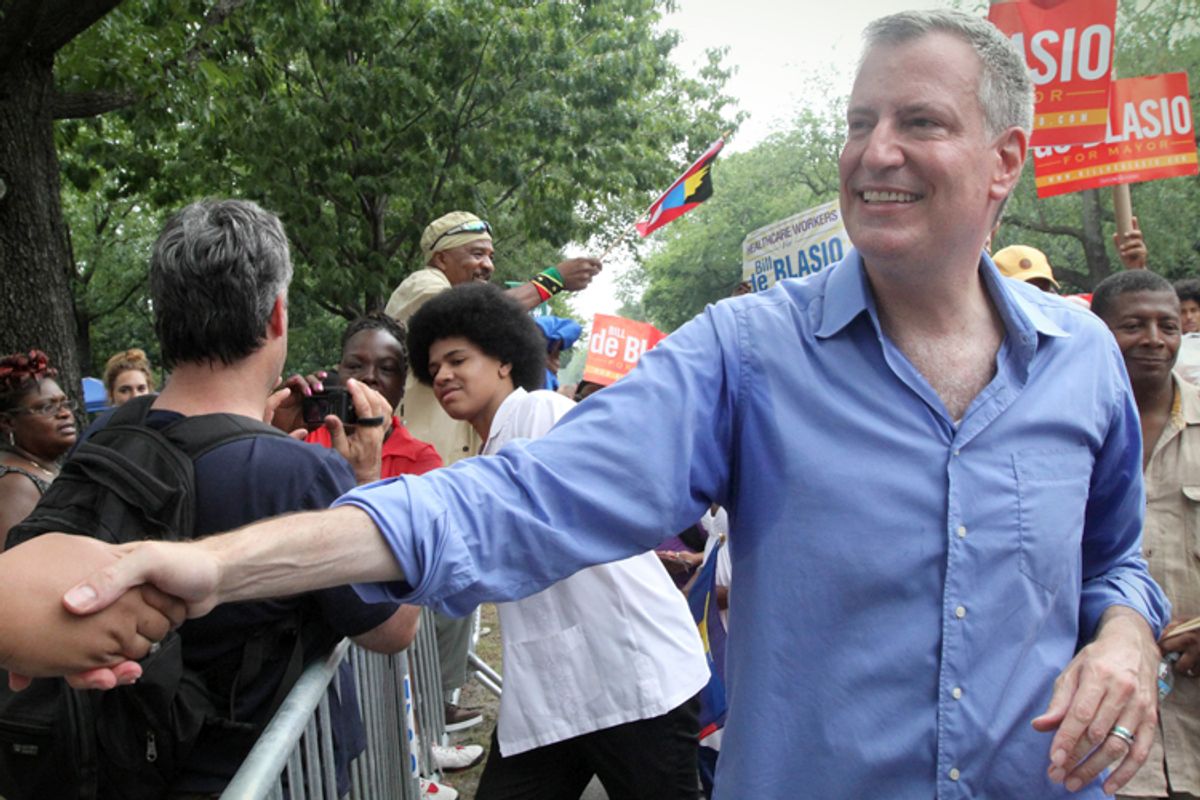NEW YORK (AP) — As New York City’s contentious primary campaign drew to a close Tuesday, some voters – including one leading mayoral candidate – encountered problems with the city’s decades-old voting machines.
Turnout appeared light, but the city’s complaint line received several thousand voting-related calls. Many reported jams and breakdowns in the antiquated lever machines, which were hauled out of retirement to replace much-maligned electronic devices.
In some sites, the broken machines forced voters to use pen and paper to cast their ballot. Republican mayoral candidate Joe Lhota presumably wrote his own name when his machine broke at his Brooklyn polling place. Democrat Anthony Weiner, whose mayoral campaign was dogged by a persistent sexting scandal, also encountered a problem when poll workers were briefly unable to find his signature.
Other candidates had no trouble voting for themselves, including Democratic front-runner Bill de Blasio, the city’s public advocate, who is pitching himself as the cleanest break from Mayor Michael Bloomberg’s administration.
And while just weeks ago his campaign was an afterthought, he now has a legitimate shot of surging right past the 40 percent mark that would avoid a runoff three weeks from now.
“He’s the candidate that represents the most change,” said Joshua Bauchner, 40, an attorney who voted in Harlem for de Blasio.
A Quinnipiac University poll released Monday, de Blasio was the choice of 39 percent of likely Democratic voters.
De Blasio’s rise was as sudden as it was unexpected. He benefited from placing his interracial family at the heart of his campaign, connecting with voters over the need for NYPD reforms, and by drawing away voters from Weiner following the former congressman’s latest scandal.
If de Blasio’s support holds, the other spot in a potential runoff Oct. 1 appears to be a matchup between City Council Speaker Christine Quinn and former Comptroller Bill Thompson.
Quinn, who is bidding to become the city’s first female and first openly gay mayor, led the polls for most of the year but has seen support disappear as her rivals have repeatedly linked her to the bitter debate to let Bloomberg run for a third term in 2009.
“I think she’s got the experience from working with Bloomberg,” said Lupe Moreno, 65, a real estate broker, who voted in Harlem for Quinn.
Thompson, the race’s lone African-American, who stunned the political world in 2009 by nearly upsetting the billionaire Bloomberg, has said he is counting on winning the bulk of black and Latino voters to propel him to the runoff.
Harlem voter Joe Beverly said he would not decide between Thompson and de Blasio until he was in the booth.
“Two very good candidates,” said Beverly. “The most important issue to me is city economics and the disparity, the tale of two cities, rich and poor; stop and frisk the way the police act, and the future of the city.”
Republicans will look to continue an improbable winning streak. Though outnumbered by Democrats in the city 6 to 1, the GOP has won the last five mayoral elections. Bloomberg was an independent running on the Republican line four years ago.
Lhota, the former MTA chairman who received acclaim for steering the transit agency through Superstorm Sandy last fall, has led the polls all campaign. A former deputy mayor to Rudolph Giuliani, Lhota has pledged to maintain the city’s record low crime rates.
His primary challenger is John Catsimatidis, a billionaire grocery store magnate who has unleashed a series of blistering attack ads on Lhota, including one that mocks the front runner for dismissing Port Authority police officers as “mall cops.” Catsimatidis has spent more than $4 million of his own money on the race, but that’s a far cry from the $102 million Bloomberg spent four years ago.
Bronx voter Fabian Feliciano, a 43-year-old city social services worker, called Lhota the best all-around candidate, adding, “He’ll really take care of the middle class.”
Also Tuesday, former Gov. Eliot Spitzer was trying to make a political comeback in the Democratic primary for city comptroller. Seeking to rebuild a political career devastated by a prostitution scandal, Spitzer took on Scott Stringer, Manhattan’s borough president.
NY mayoral primary plagued by voting machine problems
A light turnout was burdened with jams and breakdowns of old machines
Published September 10, 2013 11:01PM (EDT)

By Associated Press
MORE FROM Associated Press


Shares